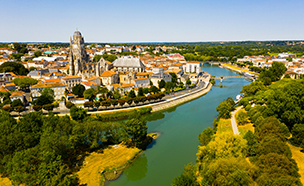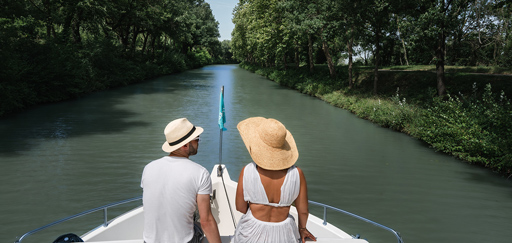Canal boat holidays can feel out of reach for many holidaymakers and are regularly seen as an extravagant and skilled way of travelling through waterways. And yet, this really doesn’t have to be the case; canal boat holidays for beginners can be fruitful, exciting and rewarding. With little preparation and practice, even the most inexperienced boatsman can enjoy a canal boat holiday through some of Europe’s most beautiful canals and waterways.
This beginner’s guide to canal boat holidays will provide all of the information and expertise needed to create a memorable boating trip, from what you need before you go, what you are required to bring, safety measures, and much more.
Read on and begin your boating journey, making boating holidays in France and beyond a regular experience.
Preparing for your canal boat holiday
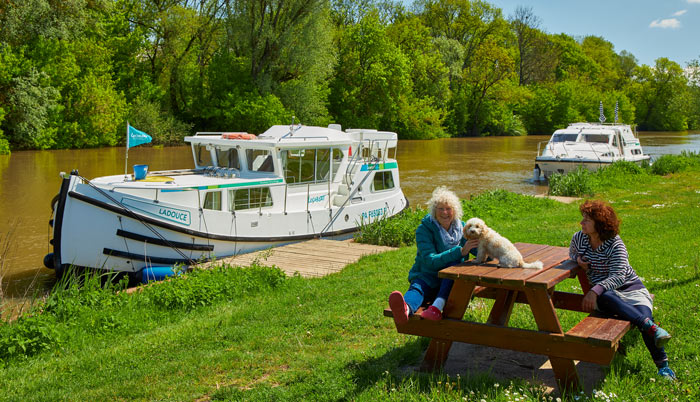
Canal boat holidays are very different from a traditional vacation, and there are a number of unique things you need to prepare for before you set out. Some of these are physical preparations, while others are part of the admin of travelling on a canal boat.
Understanding what to pack
Like any holiday, ensure you pack enough clothes for your journey; travelling along the waterways of Europe will require a range of clothing, as you may not always be lucky with the weather. Although you will be bringing a suitcase for your belongings, it’s best practice to unpack before you set out from the dock, leaving your suitcase in the safe keeping with the Locaboat base. Preparing all your food and goods before you leave is another must-do, and although you will make many stops along the way, having your boat stocked up will allow you to be far more comfortable.
Although your boat will have many amenities to make your holiday a great one, there are certain items that you can bring along that will help you as a beginner. These include practical things such as working gloves, which you will need when you hold ropes in the locks. Others can be more leisurely, such as board games, books and travel guides to keep you entertained.
Completing the paperwork
Before you set out on your canal boat holiday, you will need to complete several pieces of paperwork. These include the hiring agreement with Locaboat as well as a temporary boating permit known as a “Carte de Plaisance” in France or a “Charterschein” in Germany. You will also be required to pay an insurance deposit for the boat, a fee that will be returned to you once you arrive back at base.
Once you’ve completed all of the necessary paperwork, you’ll undergo a period of instruction on how to drive the boat. This is one of the most important preparations in the canal boat hire process and will leave you full of confidence to enjoy your holiday safely.
Safety measures to keep in mind during a canal boat holiday
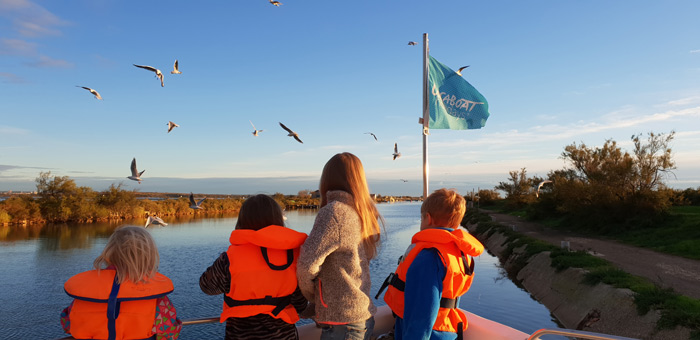
French canal boating holidays are all about having fun, leisurely boating along the waterways of Europe and taking in both nature and the local sights. This being said, driving a large vessel along canals is not without its hazards, so safety measures are paramount throughout your holiday. As a beginner, you will be briefed about the dos and don’ts of boat safety, ensuring you have a pleasant trip without any mishaps.
Avoiding others in the water
One of the seemingly obvious but important safety measures is to keep a watch out for possible collisions along the waterways. Canal du Midi boat hire is especially popular and can mean there are many other boaters along the canal. When passing an oncoming boat, ensure you pass on the port side, with the opposite boat passing on your left. If working boats come up behind, it is far safer to slow down and allow the boat to overtake yours.
If you think you are going to make contact with another boat or object accidentally, be sure to warn your passengers beforehand so they can prepare themselves. When manoeuvring around the boat while it is moving, it’s good practice to use the grab rails surrounding the outer deck of the boat. Wearing good grip footwear will also go a long way to keeping steady while on the boat.
Using equipment correctly
Always ensure you use your boating tools and add-ons correctly; when you use a boat hook, be sure not to keep the handle in front of you, as it can pull you off unexpectedly. The same goes for mooring ropes – never tie ropes across the towpath, as walkers and cyclists might get hurt. Mooring ropes shouldn’t be wrapped around your wrist when you’re using them to tie your boat; a sudden jerk can pull you from the boat and entangle your wrist, often with damaging effects.
Keeping passengers safe
As many canal boat holidays are booked by families, it is important to keep younger boaters safe. Children, as well as those who aren’t confident swimmers, should always wear their lifejackets whenever they are on the boat’s deck and should be supervised at all times should they go for a swim in the water.
Planning your route
One of the best things to do to keep safe on the water is to preplan your route, giving you the chance to become accustomed to the twists and turns of the river or canal before you set off. This will allow you to keep your wits about you and your observation skills at their very highest while on the water; this awareness will keep you safe at all times.
Which bases and itineraries are best fitted for beginners?
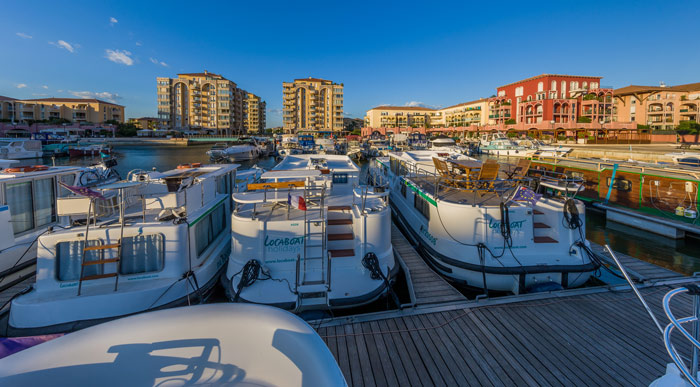
Canal boat holidays for beginners can be a little overwhelming for the true novice, so choosing a base and itinerary that is more beginner-friendly is a great way to start your canal boating experience. There are a number of itineraries and destinations that are far better for the beginner boater as they have less traffic, fewer locks and wide open spaces that allow you to navigate the routes with ease.
Boating holidays in Alsace for beginners
You’ll find one of the best routes for beginners in the French region of Alsace. Boating holidays in Alsace are ideal for beginners as the traffic here is relatively low, and there is a limited number of locks along the canal, making it a far simpler route for anyone who isn’t yet confident manipulating canal locks. The region stretching along France’s far eastern borders with Germany is one of the country’s most picturesque regions, flanked by wide open meadows, rolling hills and charming towns.
Boating holidays in Brittany for new boaters
Another of France’s popular boating regions for beginners is the northwest region of Brittany. Boating holidays in Brittany take you along the Nantes Brest canal, a winding waterway that connects these two iconic Bretton cities together, interspersed with rolling French countryside.
This simple route and lack of numerous locks is another reason why Brittany makes an ideal starting route for canal boat holidays for beginners . Another route through this northwest French peninsula is along the Vilaine, taking you from Nantes to Rennes, a fantastic route for beginners looking for canal boat hire in Brittany.
Boating holidays in Camargue for green sailors
For a touch of the southern France Mediterranean coast, boating holidays in Camargue bring the glamour and weather of more famous southern French routes such as the Canal du Midi. Unlike the Canal du Midi, boating holidays in Camargue can be done without needing too much expert experience.
How to navigate your boat through canal locks
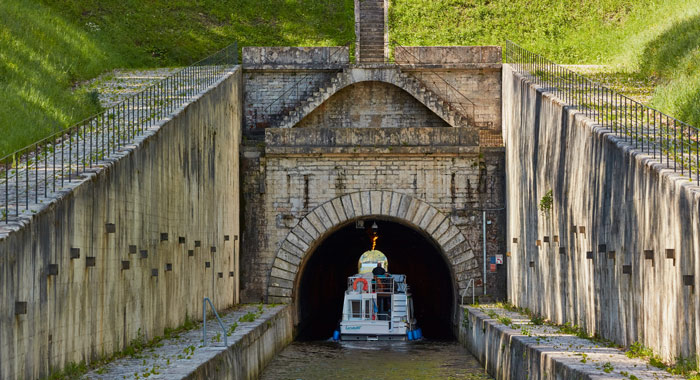
Navigating your boat through canal locks is something that can be a little daunting when you sail off on your first canal boat adventure. Although it may seem like a new and unusual task at first, you’ll soon become an expert by the end of the holiday.
The first thing you need to take into account is lock etiquette. Local lock keepers aren’t obliged to help you tie up your boat; if they do, it is out of pure kindness. Many lock keepers are of this persuasion and are usually happy to assist you in navigating the locks.
Generally speaking, it will take you around 15 to 20 minutes to pass through a lock, and rules vary depending on the country you’re in. For example, in France and the Netherlands, you must keep your engine running as you enter the lock. However, in Germany, you will need to shut the engine off.
You must also tell the lock keeper if you want to stop before reaching the next lock. Locks can accommodate several boats at once, so sometimes, you may have to wait a little while the lock keeper groups boats together in the lock in a bid to save water. Whenever you are travelling along waterways with commercial traffic, it is important to remember that commercial barges always have priority at locks.
Other important rules for navigating your boat through canal locks include remembering to always go into the lock with the boat’s power on; if the propeller isn’t turning, you will have no control over the boat.
Never jump down from the lock side onto the roof of the boat. Not only it is dangerous for you, but it could also damage the boat, particularly if it has a sliding roof. If you choose to help out the lock keeper, always follow and respect his or her instructions at all times – your help is always at your own risk and responsibility.
Types of canal locks
Not all locks along Europe’s rivers and canals are the same, and on canal boat holidays for beginners , you are likely to encounter many different types.
The first is the oldest type of lock, and now, the rarest type. Known as a manually operated lock, this is by far the most sociable lock of them all, as you will need to interact with the keeper beforehand and may wish to help work the lock.
You may also encounter a manually operated lock without a lock keeper. These locks are small in size and are only found in a handful of little-used canals and rivers – the boat crew must operate them themselves as they pass through.
Other types of locks along Europe’s waterways include electrified locks with a lock keeper. Again, these are operated by a lock keeper, so will be a sociable interaction, yet there is far less to do in terms of opening the locks. Automatic electrified locks without a lock keeper will require you to understand the rules and regulations yourself. Details of how to operate them will be given to you or explained at the departure base, but in some cases, a radar detects your boat and sets the operation in progress; in other cases, an electronic smart card or a remote control system is used – this control will also be given to you at the departure base.
The last type of lock you may have to navigate your way through is the large mechanised lock with a lock keeper. These locks are far bigger and are frequently found on big rivers and canals. Entry into these locks is controlled by traffic lights, showing green and red lights, and you will need to follow the instructions given to you, often through a loudspeaker. As there are multiple boats in the large mechanised lock, you will be required to wear lifejackets at all times.
When exiting any lock, you should wait for the gates to be completely opened and then go out straight ahead and in the middle of the channel to minimise the risk of scraping the lock walls. You should also check that the fenders are in position and use the boat hook if it is necessary.
Final thoughts on canal boat holidays for beginner
Canal boat holidays for beginners can bring a whole new way of looking at travelling, holidaymaking and adventure. Although it may seem like a huge first step for many, boating holidays along Europe’s most celebrated waterways are simple once you know how. Enjoying a Locaboat holiday takes only an understanding of boat and waterway safety, a passion for riverboat travel and an open-minded sense of adventure. With all of this, you’ll be boating your way through famous canal routes such as the Canal du Midi in no time.





